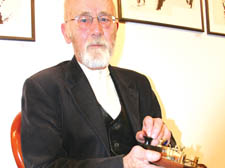|
|
 |
| |
 Alan Sillitoe demonstrating a Morse code machine at Foyles bookshop in Charing Cross Road: “What you learn at 18, you learn for life” Alan Sillitoe demonstrating a Morse code machine at Foyles bookshop in Charing Cross Road: “What you learn at 18, you learn for life” |
Tapping into mind of Sillitoe
As his 1970 novel A Start in Life is rereleased to mark his 80th birthday, Alan Sillitoe tells Dan Carrier about working in the ‘communication trade’ – and mastering Morse code
A Start In Life.
By Alan Sillitoe
London Books £11.99 order this book
MICHAEL Cullen is a womanising criminal, a con man with an eye for an easy score, a strip club enforcer, chauffeur for a gangland boss and international gold smuggler.
Cullen looks after number one, thinks nothing of betraying his partners and cheating on his numerous girlfriends.
The criminal is one of novelist Alan Sillitoe’s most enduring characters, and the book, A Start In Life, which tells his story, has been re-released in time for the author’s 80th birthday.
Sillitoe published it in 1970. It was his sixth book. But if it were not for the Royal Air Force, Sillitoe would never have had the chance to pen a series of novels that re-invigorated working- class writing and invent the kitchen-sink drama which came to be a major movement in literature and on screen during the late 1950s and 1960s.
Born in Nottingham, Sillitoe’s first novel, Saturday Night and Sunday Morning, brought him instant success.
He became known as one of the original “Angry Young Men”, and nothing illustrates this better than the low-life tale of Cullen.
Speaking to the New Journal after reading from A Start In Life at Foyles bookshop in Charing Cross Road, he recalled how his first attempts at writing focused on the link between poverty and crime.
“I had two cousins who had deserted from the army during the war,” he said.
“They couldn’t get identity cards so they couldn’t get jobs. They became thieves and would steal and then trade things on the black market. I remember asking them to steal me a typewriter.
“They’d come round and tell us tales of their adventures, which I wrote down in a big book.”
It took him some time to realise he wanted to be a writer. But Sillitoe says he has always been involved in what he calls the “communication trade”.
“A writer is a communicator,” he says. “You write a book and you hope it’s going to be published and, if it is, you are communicating. You are breaking bread between yourselves and others.
“The thing is, this communication trade was new to me when I began to write.”
After leaving school he operated a lathe in a Nottingham bicycle factory – a job the lead character Arthur Seaton in Saturday Night and Sunday Morning fills – and then had a spell working in air-traffic control.
But as with so many people of his generation, Sillitoe’s time as a National Serviceman became a defining moment in his life.
“I trained as a radio-telegrapher in the RAF, so you could say I was in the business of communication,” he says.
Sillitoe was posted to a paddy field in Malaya where he worked each day guiding planes from Darwin in Australia across to Singapore and then on to London.
“I remember there being 26 people on board a Lancastrian airliner and they had no other way to get a fixed position except from me,” he says.
“There I was, crouching in a field, with some basic Marconi equipment. In those days they had sextants on board aircraft, but they were unusable.
“I gave the pilots bearings and I brought them in right over the runway in Singapore.”
Sillitoe says he can still transmit Morse code: “What you learn at 18, you learn for life.”
He looks back on his time as a serviceman with fondness and says if it were not for the RAF, he would never become a writer.
“When I came out of the RAF I had TB,” he says. “I went crazy – I did not know what would happen to me.”
He had contracted the it while on active service and at the time, 25 per cent of people stricken with the disease died.
“I didn’t know if I’d ever be able to work again,” he recalls.
“I had decided to join the Canadian RAF – they had better rates of pay. Then I found myself in an RAF hospital for nine months and it was during that time I decided to write.
“I made it my duty to read as many classics as I could.
“In the next five years I read almost everything.”
Sillitoe began receiving a pension from the RAF.
“It was £5 a week,” he says. “I was being kept by a woman – her Majesty the Queen!”
|
 |
|
 |
 |
|
 |
|